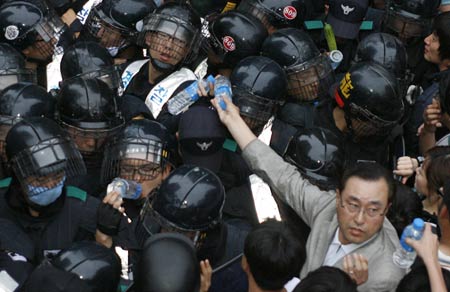
Protestors give bottles of water to riot policemen as they confront each other during a march toward the presidential Blue House in Seoul after a candle-light vigil June 7, 2008.(Xinhua/Reuters Photo)
South Korean President Lee Myung-bak has been ailed by escalating public protests over his administration's dealing with Washington to fully resume beef imports from the United States.
Tens of thousands of South Koreans have held candlelight vigils almost daily since early May, calling for a renegotiation of the deal, which is a result of concerns over the mad cow disease.
The beef imports issue is the most complicated challenge that Lee has faced since taking office in February.
Disturbing beef imports dead
US beef has been shut out of South Korean markets since the first known case of the mad cow disease in the United States was found in December 2003.
In April 2007, South Korea reopened its market to US beef but suspended imports again in October that same year after finding bones in imported US beef.